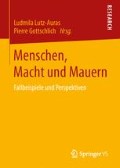Zusammenfassung
Viele europäische Besucher Lateinamerikas sind überrascht, wenn sie bemerken, wie leidenschaftlich die deutsche Philosophie in dieser Weltregion gelesen und diskutiert wird. Umgekehrt kennen die meisten europäischen Philosophen kaum lateinamerikanische Philosophen. Dieses Phänomen wird in den Geistes- und Sozialwissenschaften als Zentrum-Peripherie Beziehung in der Wissenszirkulation diskutiert.
Access this chapter
Tax calculation will be finalised at checkout
Purchases are for personal use only
Preview
Unable to display preview. Download preview PDF.
Literaturverzeichnis
Alberini, Coriolano: Discurso del vice-presidente del Comité de Honor y secretario técnico del Congreso, Dr. Coriolano Alberini, de la Universidad de Buenos Aires, en representación de los miembros argentinos, in: Actas del Primer Congreso Nacional de Filosofía. Tomo I. Universidad Nacional de Cuyo, Mendoza 1950, S. 62-80.
Alemann, Peter: Begegnung mit deutschen Professoren. Randbemerkungen zum Philosophie-Kongress in Mendoza, in: Argentinisches Tageblatt, Buenos Aires 1949.
Astrada, Carlos: Naturaleza e historia en el ámbito argentino, in: Cuadernos de Filosofía, Fascículo III, Buenos Aires 1949, S. 146-147.
Bollnow, Otto Friedrich: Philosophenkongreß in Mendoza, in: Halbmonatsschrift für das deutsche Hochschulleben, 9, Göttingen 1949, S. 13.
Bourdieu, Pierre: Die politische Ontologie Martin Heideggers, Frankfurt am Main 1988.
Brinkmann, Donald: Der geistige Standort Lateinamerikas, in: Universitas. Zeitschrift für Wissenschaft, Kunst und Literatur, 5, Stuttgart, 1949, S. 519-524.
Buchbinder, Pablo: Historia de las Universidades Argentinas, Buenos Aires 2005.
Delannoy, Franck: Gadamers frühes Denken und der Nationalsozialismus, in: Heinz, Marion/Gretic, Goran (Hg.): Philosophie und Zeitgeist im Nationalsozialismus, Würzburg 2006, S. 327-351.
Devés Valdés, Eduardo: El pensamiento latinoamericano del siglo XX: Entre modernización e identidad. Tomo I: Del Ariel de Rodó a la CEPAL (1900-1950), Buenos Aires 2001.
Dotti, Jorge: Carl Schmitt en Argentina, Buenos Aires 2000.
Gadamer, Hans-Georg: Philosophische Lehrjahre. Eine Rückschau, Frankfurt am Main 1977.
Gadamer, Hans-Georg: Discurso del Profesor Hans-Georg Gadamer, de la Johann-Wolfgang Goethe Universität de Frankfurt, en representación de los miembros europeos, in: Actas del Primer Congreso Nacional de Filosofía. Tomo I, Mendoza 1950, S. 85-88.
Grassi, Ernesto: Reisen ohne anzukommen. Eine Konfrontation mit Südamerika, Hamburg 1955.
Grassi, Ernesto: Contacto con la naturaleza ahistórica y el mundo occidental técnico, in: Cuadernos de Filosofía, Fascículo III, Buenos Aires 1949, S. 147-157.
Grondin, Jean: Hans-Georg Gadamer. Eine Biographie, Tübingen 1999.
Halperín Donghi, Tulio: Historia de la Universidad de Buenos Aires, Buenos Aires 1962.
Janicaud, Dominique: Heidegger en France. I. Récit, Paris 2001.
Keim, Wiebke: Vermessene Disziplin: Zum kontrahegemonialen Potenzial afrikanischer und lateinamerikanischer Soziologien, Bielefeld 2008.
Klengel, Susanne: Die Rückeroberung der Kultur. Lateinamerikanische Intellektuelle und das Europa der Nachkriegsjahre (1945-1952), Würzburg 2011.
Löwith, Ada: Nachbemerkung, in: Löwith, Karl: Mein Leben in Deutschland vor und nach 1933. Ein Bericht, Stuttgart 1986, S. 159-160.
Magnone, Carlos/Warley, Jorge: Universidad y peronismo (1946-1955), Buenos Aires 1984.
Maliandi, Ricardo/Fernández, Graciela: Valores blasfemos. Diálogos con Heidegger y Gadamer, Buenos Aires 2009.
Medin, Tzvi: Ortega y Gasset en la cultura hispanoamericana, México 1994.
Mignolo, Walter (Hg.): Capitalismo y geopolítica del conocimiento: el eurocentrismo y la filosofía de la liberación en el debate intelectual contemporáneo, Buenos Aires 2001.
Molinuevo, José Luis (Hg.): Ortega y la Argentina, Madrid 1997.
Orozco, Teresa: Platonische Gewalt. Gadamers politische Hermeneutik der NS-Zeit, Hamburg 1995.
Palmer, Richard: A Response to Richard Wolin on Gadamer and the Nazis, in: International Journal of Philosophical Studies, Volume 10, Issue 4, London 2002, S. 467-482.
Perón, Juan Domingo: La comunidad organizada. Esbozo filosófico, Buenos Aires 1949.
Portantiero, Juan Carlos: Estudiantes y política en América Latina: El proceso de la reforma universitaria (1918-1938), México D.F. 1978.
Pró, Diego: Coriolano Alberini, Buenos Aires 1960.
Richard, Nelly: Periferias culturales y descentramientos postmodernos, in: Punto de vista. Revista de Cultura, 40, Buenos Aires, 1990, S. 5-6.
Ruvituso, Clara: Diálogos existenciales. La filosofía alemana en la Argentina peronista (1946-1955), Frankfurt am Main/Madrid 2015.
Ruvituso, Clara: La productivité d’une reception: Lectures, circulation et usages de Heidegger dans l’Argentine du péronisme classique, in: Revue d’anthropologie des connaissances, Vol. 9, No. 3, 2015, S. 387-402. http://wwwcairn.info/revue-anthropologie-des-connaissances-2015-3-page-387.htm. (Stand 27.12.2015).
Sarlo, Beatriz: Una modernidad periférica: Buenos Aires 1920 y 1930, Buenos Aires 1988.
Torre, Juan Carlos (Hg.): Los años peronistas (1943-1955), Buenos Aires 2002.
Universidad Nacional de Cuyo: La Universidad y la Revolución. Ministerio de Educación de la Nación, Mendoza 1950.
Wolin, Richard: Fascism and Hermeneutics: Gadamer and the Ambiguities of ‘Inner Emigration’, in: Bialas, Wolfgang/Rabinbach, Anson (Hg.): Nazi Germany and the humanities, Oxford 2007, S. 101-139.
Author information
Authors and Affiliations
Corresponding author
Editor information
Editors and Affiliations
Rights and permissions
Copyright information
© 2016 Springer Fachmedien Wiesbaden
About this chapter
Cite this chapter
Ruvituso, C. (2016). Risse in den Mauern der Zentrum-Peripherie-Beziehungen im philosophischen Feld: Die Reise deutscher Philosophen nach Argentinien im Jahr 1949. In: Lutz-Auras, L., Gottschlich, P. (eds) Menschen, Macht und Mauern. Springer VS, Wiesbaden. https://doi.org/10.1007/978-3-658-12499-1_20
Download citation
DOI: https://doi.org/10.1007/978-3-658-12499-1_20
Published:
Publisher Name: Springer VS, Wiesbaden
Print ISBN: 978-3-658-12498-4
Online ISBN: 978-3-658-12499-1
eBook Packages: Social Science and Law (German Language)

